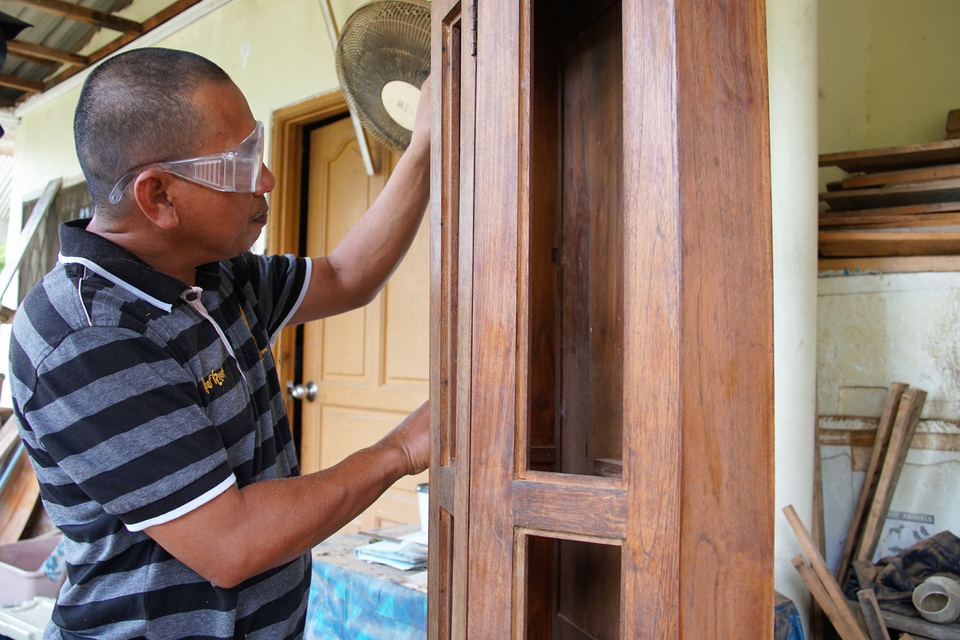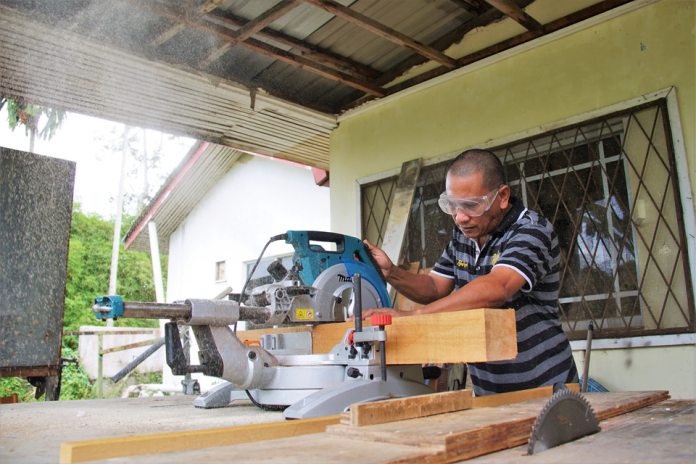At 40, there was little to indicate on Ajis Dollah’s rap sheet that he was going to turn his life around as he entered Jerudong prison in 2009 to serve four years – his longest sentence yet.
He had been in-and-out of jail since 1992 for drug abuse, leaving his family of four behind. Ajis was desperate for a change, but he had nothing practical to anchor his emotions – he thought little of his skillset and would find it hard to envision a life in which he would take charge, arrest his downward spiral and redeem himself to his family.
Ajis had never held down a professional job up to that point, his most productive stint arguably being a handyman doing a wide range of repairs for his brother’s small construction company based out of Belait.
“I had put my family through too much,” said Ajis, now 49-years-old. “I asked God for forgiveness, for not being the father and husband my family needed.”
Vocational programmes for inmates have run since the Prison’s Department’s establishment since 1959, offering training in welding, agriculture, cooking and carpentry with a simple motive – upskilling inmates to have a marketable craft upon leaving.
Ajis had paid little attention to them previously, but he resolved that he would take them seriously this time. It’s common sense – that’s backed by research abroad – that finding employment soon after leaving prison – while by no means a guarantee – does significantly reduce the likelihood of a relapse into crime.
At the workshop, Ajis choose woodworking and carpentry, fondly recalling his childhood where his family would handcraft tongkat or walking sticks and Malay daggers called keris.
“During the LVK (Latihan Vokasional dan Kemahiran) I paid close attention to all the fundamentals; how to operate machinery and the basics of designing different items,” said Ajis. “I was also taught how to be resourceful; how I could still build if I didn’t have the money for advanced machines.”

During public roadshows, the Prisons Department would often retail the inmates’ creations’, which also lead to more custom orders being placed. “That’s when I really started to see the (commercial) value of carpentry and woodwork,” said Ajis. “There was a chance that I could do on this outside.”
When he left the prison gates in 2012, his wife Ernawatie Hj Ahmad, who remained steadfastly loyal throughout his struggles, was waiting. Ajis immediately got to work in the backyard of his in-laws’ house in Manggis, woodworking small items like the keris, tongkat, jewellery boxes and rihal – a stand that holds the Al-Quran.
“I named the company AE Jaya Enterprise after me and my wife’s name,” said the 49-year-old, who has two children in secondary school and another in primary. “There could be no excuses now. It didn’t matter if no one would hire me. I had a skill; I could build and I could sell.”
With the help of a $2,000 grant from the Brunei Economic Development Board’s YDR scheme, Ajis was able to purchase basic equipment that enabled him to make furniture – tables and wardrobes being the most popular.
In unearthing the truth about what motivates us, best-selling author Daniel Pink builds a convincing case that it’s autonomy – the urge to direct our own lives; mastery – the desire to get better at something that matters; and purpose – the yearning to do what we do in service of something larger than ourselves.
Ajis arguably had all three after leaving prison; a company he had to self direct, a skill that he could build on and a renewed drive to redeem himself in the eyes of those he had let down.

Marketing himself through word-of-mouth and WhatsApp, Ajis was able establish consistent monthly sales of a few thousand dollars. Two years ago, Yayasan Sultan Haji Hassanal Bolkiah, followed by the Islamic Religious Council of Brunei (MUIB) offered assistance, enabling AE Jaya to purchase larger tools like a compoud milter saw, and Ajis began to undertake more carpentry-based orders – including outfitting doors and cabinets in houses.
More recently, Ajis was selected by Yayasan’s Projek Bakarih – an initiative to guide budding local entrepreneurs by providing them with business knowledge, training and mentoring.
“When we were sent to Kalawon Academy in Sabah to learn about entrepreneurship, it was a turning point for me,” says Ajis. “Even though the business is still very small, I was no longer just an ex-con. No longer the guy who people had to worry about, wondering if he could stand on his own two feet.”
“It is never too late to turn things around,” he adds. “When you are at the very bottom; if you repent, God will show you the way but it is you that must begin the climb. It will be difficult. But you will make it, when you remember that it is not just for yourself, but for those that depend on you.”
To learn more follow @aejaya_tukang and contact +6737261795 to contact Ajis to inquire or order directly.












